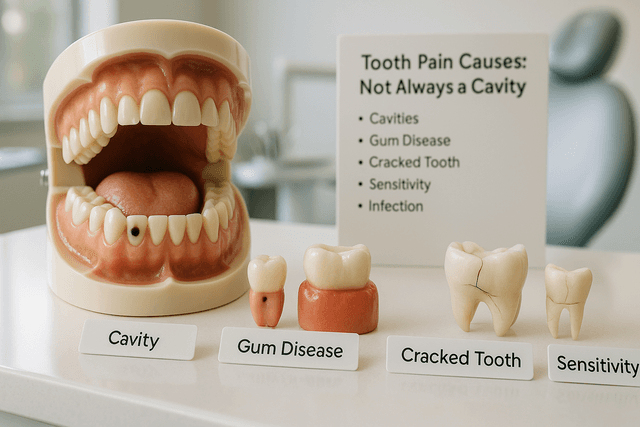General Dentistry
Mouth Sores After Dental Work: Causes, Treatments, and When to Worry
You just had dental work done, maybe a filling, an extraction, or a root canal, and now there’s an annoying sore inside your mouth that wasn’t there before. Sound familiar? Mouth sores after dental procedures are more common than most people realize, and while they’re usually harmless, they can be surprisingly painful.
5 min read
May 26, 2025

You’ve just left the dentist’s chair, numbed up, cleaned out, or maybe even minus a tooth or two. You figure you’re in the clear. But then it hits you. That little sting inside your cheek or along your gumline. You brush it off at first. Maybe it's just irritation from keeping your mouth open too long, or the way you accidentally bit down on the numbed side. But the next day? There it is. A full-on sore that hurts when you eat, talk, or even breathe funny.
If this sounds familiar, you’re not alone. Mouth sores after dental work are surprisingly common, and while they’re usually harmless, they can be a real pain, literally. Let’s unpack what’s really going on, when to relax, and when to pick up the phone and call your dentist.
Canker Sores: The Usual Suspect
Let’s talk about the little villain here, canker sores. These are small, round or oval ulcers that show up inside your mouth. They can land just about anywhere: under your tongue, along your gumline, on the inside of your lips, or your cheeks. Unlike cold sores, which are caused by the herpes virus and show up outside the mouth, canker sores stay inside and aren't contagious.
They usually start with a slight burning or tingling sensation before blossoming into a painful ulcer. Most are white or yellow with a red border and can last a week or two. Annoying? Yes. Dangerous? Usually not.
So, Why Now? What Triggers Canker Sores After Dental Work?
Great question. Dental work can do a number on the soft tissues in your mouth. Whether it’s a tooth extraction, a root canal, or even just a rough cleaning, your mouth goes through a bit of trauma.
Here are a few common triggers for developing canker sores after a dental visit:
Minor injuries: Accidentally biting your cheek during or after the procedure. (Blame the lingering numbness.)
Dental materials: Some people are sensitive to certain materials used during dental procedures, like fillings or numbing agents.
Stress: Emotional stress can trigger sores. And let’s be real, even thinking about a root canal is enough to raise anyone’s blood pressure.
Dry mouth: That cotton-mouth feeling you get during procedures? It dries out the protective layer on your tissue, making sores more likely.
Change in oral environment: Your mouth gets used to its routine. Disturb that with tools, pressure, or extra cleaning, and sometimes your body just reacts.
So yes, getting canker sores after a tooth extraction or any dental treatment isn’t unusual. The combination of physical irritation and stress can absolutely cause canker sores to appear.
Wait, Could This Be Something Else?
Maybe. Not every sore is a canker sore. Let’s break it down.
Mouth sores after dental procedures can show up as:
A standard canker sore
A blister from friction or irritation
A reaction to dental materials
In rare cases, an ulcer from infection or poor healing at the extraction site
If the sore is right where a tooth was pulled, you’ll want to keep a close eye. Is it just sore, or does it seem infected? Is the pain getting worse instead of better? If it’s more than just a surface-level lesion, call your dental professional. You might be dealing with an infection caused by bacteria getting into the healing tissue.
Canker Sores After a Root Canal or Extraction
A root canal procedure or tooth extraction can definitely lead to sores forming around the treated area or elsewhere in your mouth. During a root canal procedure, instruments can irritate nearby tissues. Combine that with anxiety and a long time in the chair? That’s a recipe for a mouth ulcer or two.
Extractions are similar. Your mouth is healing, and your immune system is busy. So a canker sore popping up a few hours, or even a day, afterward isn’t surprising. These sores after a tooth extraction may not be directly on the extraction site, but they’re often nearby.
Symptoms of Canker Sores to Watch For
Just to make sure we’re on the same page, here’s what symptoms of canker sores look like:
A painful ulcer that’s white or yellow inside
A red ring around the sore
Pain when eating, brushing, or talking
Sometimes a general sense of discomfort, even a mild fever in rare cases
These sores are the most common type of mouth ulcer, and while they usually appear solo, some folks get clusters.
What Can You Do About It?
Here’s the good news: You don’t have to suffer in silence. There’s a whole menu of home remedies and products that can help.
Salt water rinse: Mix half a teaspoon of salt into a glass of warm water and rinse gently. It helps reduce irritation and keeps the area clean.
Hydrogen peroxide rinse: If your dentist gives you the green light, this can disinfect a sore. Just don’t swallow.
Over-the-counter gels: Look for numbing gels to dull the pain while your mouth heals.
Avoid spicy or acidic foods: No hot salsa, orange juice, or chips with sharp edges.
Good oral hygiene: Be gentle, but don’t slack on brushing. Clean teeth help prevent infection.
These remedies can often alleviate pain and help the sore heal within a week or two. But if it’s still hanging around after that, or if you keep getting them, ask your dentist about other treatment options.
When Should You Worry?
Most sores heal without treatment and don’t require medical help. But here are your red flags:
The sore hasn’t gone away within two weeks
It’s growing or seems infected
You’re experiencing high levels of pain or can’t eat properly
You’ve got a fever or swollen glands
Sores keep coming back after dental visits
In those cases, consult your dentist. You might need a prescription mouth rinse, a steroid paste, or a look at your overall oral health to rule out something more serious.
Preventing Future Sores
If you’ve had canker sores after a tooth procedure before, you know how un-fun they are. Here’s how to try to stop them before they start:
Let your dentist know, especially if you’ve had major canker sores in the past
Use a soft-bristled toothbrush and non-irritating toothpaste
Eat a balanced diet rich in vitamins like B12, folate, and iron
Practice stress management (yes, seriously, stress is a major trigger)
Stay on top of regular dental check-ups so issues get caught early
The Bottom Line
Canker sores can also show up after dental work, and while they can be miserable, they’re usually manageable. Whether you’ve just had a cleaning, root canal, or tooth extraction, don’t panic if a sore appears. Your mouth has been through a lot. It’s just asking for a little TLC.
So take it easy, rinse with salt water, maybe lay off the chips and salsa, and if something still feels off? See your dentist. You’re not being dramatic, you’re being smart about your oral health. And that’s something to smile about.
Is It Normal To Get a Canker Sore After Dental Work?
Yes, it’s fairly common to develop a canker sore after dental procedures like cleanings, root canals, or extractions. Soft tissues in your mouth may become irritated from instruments, materials, or accidental biting during numbness. Combined with stress or dry mouth, this irritation can trigger a sore.
How Can I Tell If It’s a Canker Sore or Something More Serious?
Canker sores are usually round, white or yellow with a red border, and occur inside the mouth. If the sore grows, lasts more than two weeks, becomes extremely painful, or you develop a fever or swollen glands, it could indicate infection or another issue, call your dentist for evaluation.
What Can I Do To Relieve the Pain From a Mouth Sore?
You can rinse with warm salt water, avoid spicy or acidic foods, apply over-the-counter numbing gels, and maintain gentle but consistent oral hygiene. These steps help soothe discomfort and promote healing, which typically occurs within 7 to 14 days for most canker sores.
Can I Prevent Canker Sores After Future Dental Visits?
While you can’t always prevent them, you can lower your risk by using a soft-bristled toothbrush, avoiding toothpaste with irritating ingredients, eating a nutrient-rich diet, and managing stress. Let your dentist know if you’re prone to sores, they may adjust materials or techniques to help reduce irritation.
Read Next
Related Posts

General Dentistry
Is Tooth Pain Always a Cavity or Could It Be Something Else?
Tooth pain can strike at the most inconvenient times, leaving you wondering what’s behind that sudden ache or sharp twinge. While cavities are a common culprit, they’re not the only reason your teeth might be hurting. Understanding the different causes of tooth pain can help you take the right steps toward relief and better oral health.
3 min read
Aug 25, 2025

General Dentistry
Dental Terminology for Front Desk: Boost Accuracy and Professionalism
Working the front desk at a dental office means juggling patients, appointments, and insurance details, all while staying calm and professional. One of the most powerful tools in your toolkit? A solid understanding of dental terminology. Knowing the right terms not only boosts your confidence but also improves communication and accuracy across the entire practice.
8 min read
Aug 24, 2025

General Dentistry
How Much Is a Dental Check-Up and What’s Included?
Regular dental visits are about more than keeping your smile bright, they’re essential for preventing serious oral health issues and saving money on future treatments. Understanding what’s included in a dental check-up and how much it costs can help you plan better and make informed decisions about your care.
5 min read
Aug 13, 2025
Don’t have time to research every dentist around you?
See why 30k+ patients trusted us